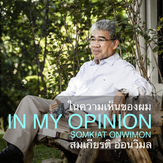|
FOREIGN POLICY: นี่ไม่ใช่การเมืองตามความเป็นจริง แต่เป็นเรื่องของมือสมัครเล่นทำนโยบายเอเชียแบบเหลวเละ
|
|

VOICE
This Isn’t Realpolitik. This Is Amateur Hour. The Trump administration’s Asia policy is the worst of all possible worlds.
Nothing could be further from the truth. For realists, the key to U.S. security is maintaining dominance in the Western Hemisphere and preventing any peer competitor from dominating the vital power centers of Europe or Asia or controlling key energy resources in the Persian Gulf. Apart from the United States itself, there is only one potential “regional hegemon” in the world today: China. Accordingly, a realist policy in Asia would first and foremost seek to prevent China from consolidating a dominant position in Asia and eventually persuading its neighbors to abandon their present security ties with the United States. Were that to occur, the United States would be unable to sustain a major military presence in the Western Pacific or Southeast Asia, and China would be a de facto regional hegemon. Over time, China would be increasingly free to project power into other areas of the world, much as America does today, and maybe even try to establish security ties here in the Western Hemisphere. It follows that a realist approach in Asia calls for the United States to keep a wary eye on China and manage a sometimes delicate balancing coalition of Asian partners. This task is a tricky one that requires consistency, prudent judgment, and smart diplomacy, as well as credible military power. The latter quality is still abundant; the former, not so much. Consider what Trump has done so far. He started out by taking an imprudent congratulatory phone call from the president of Taiwan and questioning the well-established “One China” policy, only to backtrack a few days later. He abandoned the Trans-Pacific Partnership on his third day in office, thereby destroying a key institution that would have bound a number of Asian countries more tightly to the United States and undermining local leaders who had spent political capital of their own in order to reach an agreement. He berated Australian Prime Minister Malcolm Turnbull on a “get-acquainted” phone call, reinforcing growing Australian doubts about the merits of their long association with the United States. On the Korean Peninsula, Trump has jeopardized relations with another key ally by saying South Korea would have to pay for the controversial THAAD anti-missile defense system that is now being deployed there and by suggesting the existing free trade deal between the two countries has to be renegotiated or abrogated. The Defense Department quickly corrected him and said the United States would pay for THAAD as agreed, but these episodes hardly reinforced confidence in Washington’s consistency or judgment. Trump has also raised the prospect of war with North Korea — which could have disastrous effects on the South — yet followed that up by suggesting, bizarrely, that he would be “honored” to meet with North Korean leader Kim Jong Un. Coming on the heels of that misplaced aircraft carrier, is it any wonder South Koreans have doubts about following the U.S. lead (whatever it might turn out to be)? It gets worse: Instead of seeing China as a peer competitor whose rising power needs to be checked, Trump has been kissing up to Beijing in the hope of securing its help on North Korea and a number of issues. There’s nothing inherently wrong with collaborating with Beijing when our national interests (as opposed to Trump’s business interests) align, but such an approach inevitably raises doubts in the minds of China’s neighbors. It also reinforces the perception that Beijing is calling the shots in Asia. If that were in fact the case, why would anyone there want to remain closely tied to the United States? Even Trump’s impulsive outreach to Duterte shows that it is still amateur hour at the White House. One can make a pragmatic case for trying to smooth a strained relationship with a key ally; the problem is that Trump did not consult anyone about it and didn’t know if Duterte was likely to accept when he extended the invitation. Here’s a pro tip: An invitation to visit the White House is a serious matter that needs to be vetted beforehand and agreed to by both parties before it is made public. As it happens, Duterte responded by saying he might be too busy to pay a visit, thereby making Trump look foolish and desperate. Needless to say, this entire approach is the antithesis of foreign-policy realism. Realists sees international politics as a deadly serious business, especially when dealing with critical regions and potential peer competitors. Realism focuses on preserving favorable balances of power, managing critical alliances adroitly, and above all acting in ways that allow both friends and foes to tailor their actions to ours. A country whose leader understood this wouldn’t be relying on an understaffed State Department, an unqualified first daughter and son-in-law, and wouldn’t be trying to manage key relations via an uncensored Twitter account. Trump’s approach to foreign policy would make a great sitcom, opéra bouffe, or a Marx Brothers movie, but it is both disastrous and demeaning for the United States. Where we seem to be headed, alas, is the worst of all possible worlds. Trump is gradually being captured, co-opted, and contained by the foreign-policy establishment (aka the “Blob), and the radical restructuring he promised during the campaign is gradually being discarded along with goofballs like Michael Flynn and Sebastian Gorka. The result? The United States will continue to pursue an overly ambitious foreign policy and continue to try to manage events in nearly every corner of the world, much as we have for the past 25 years. But instead of having serious people in charge, we’ll now be doing it with an inexperienced, impulsive, and inept skipper at the helm. This unhappy situation may give people like me plenty to write about, but it isn’t good for the country and it sure as hell ain’t realism. Those who wish America ill could hardly ask for more. FOREIGN POLICY |

บทความจากวารสาร
FOREIGN POLICY วิจารณ์นโยบายเอเชียของสหรัฐอเมริกายุค Donald Trump ว่าเป็นแบบมือสมัครเล่น ไร้แก่นสาร ไม่มียุทธศาสตร์ ขาดความรู้ความเข้าใจในเป้าหมายของประเทศตัวเอง การที่ Donald Trump เชิญประธานาธิบดี Rodrigo Duterte แห่งฟิลิปปินส์ไปเยือนทำเนียบขาว โดยไม่ผ่านการกลั่นกรองของกระทรวงการต่างประเทศ ไม่ผ่านการศึกษาทำความเข้าใจกับบทบาทและพฤติกรรมเลวร้ายดุจอาชญากรของผู้นำฟิลิปปินส์ ไม่คำนึงถึงศักดิ์ศรีของประเทศสหรัฐอเมริกา และอดีตประธานาธิบดี Barack Obama ที่เคยถูกประธานาธิบดีฟิลิปปินส์ด่าอย่างหยาบคายมาแล้ว่าเป็น 'Son of a Whore' 'ไอ้ลูกกะหรี่' แถมออกคำเชิญประธานาธิบดี Duterte ไปโดยไม่ตรวจสอบว่าเชิญแล้วเขาจะมาตามคำเชิญหรือไม่ ซึ่งในที่สุดผู้นำฟิลิปปินส์ก็ตอบว่าว่า "สงสัยจะไม่ว่าง" ยังผลให้รัฐบาลอเมริกันต้องเสียหน้า เพราะเชิญแล้วเขาอาจจะไม่มา
ปรกติการเชิญผู้นำชาติใดมาเยือนประเทศของตน ไม่ว่าจะเป็นสหรัฐอเมริกา หรือประเทศอื่นใด จะมีระเบียบพิธีการฑูตพูดคุยสอบถามความเป็นไปได้ก่อนอย่างเงียบๆไม่เป็นทางการ โดยฝ่ายผู้เชิญจะต้องมั่นใจก่อนว่าจะเชิญมาทำอะไร เพื่อประโยชน์ในการเจรจาเรื่องอะไร แล้วต้องให้มั่นใจว่าฝ่ายผู้ถูกเชิญจะรับคำเชิญ เมื่อแน่ใจแล้วจึงค่อยแถลงอย่างเป็นทางการ แต่ในกรณีที่ Donald Trump โทรศัพท์คุยกับประธานาธิบดี Duterte แล้วออกปากเชิญไปโดยพลการ จึงเป็นการเมืองแบบสมัครเล่น ไร้ยุทธศาสตร์ ไร้แก่นสารและเป้าหมายอย่างน่าอับอาย การขาดพื้นฐานความรู้เรื่องการต่างประเทศ และขาดแม้กระทั่งความรู้เกี่ยวกับประเทศสหรัฐอเมริกาของตนเอง เป็นเรื่องที่ชาวอเมริกันกำลังอับอายชาวโลกอยู่ และเป็นที่วิตกกังวลของคนอเมริกันโดยทั่วไปอยู่มาก ว่าเฉพาะเรื่องเอเชีย Donald Trump ไม่เคยมีนโยบายเอเชียชัดเจนมาก่อน แต่ในช่วง 100 วันแรกของการเป็นประธานาธิบดี ก็พบว่า Donald Trump ได้ทำเรื่องสับสนเสียหายหลายเรื่องที่สะท้อนความเป็นมือสมัครเล่นผู้โฉดเขลา: 1. ถอนตัวสหรัฐฯออกจากความตกลงหุ้นส่วนการค้าย่านแปซิฟิค (Trans Pacific Partnership - TPP) 2. ยอมเชื่อและแถมยกย่องจีนในเป็นผู้กำหราบดูแลเกาหลีเหนือ แล้วสยบต่อจีน โดยเลิกประกาศสงครามการค้ากับจีน ไม่กล่าวหาจีนอีกต่อไปว่าเป็นผู้ปั่นเงินตราต่างประเทศ 3. ประกาศให้เกาหลีใต้จ่ายเงินค่าขีปนาวุธภาคพื้นดินTHAAD ที่สหรัฐนำไปติดตั้งปกป้องทางพรมแดนเหนือของประเทศเกาหลีใต้ 4. เสียดสีและเหยียดหยามนายกรัฐมนตรี Australia ครั้งที่โทรศัพท์คุยกันแล้วต่อว่า Australia ว่าเอาเปรียบเรื่องการส่งผู้ลี้ภัยเข้าสหรัฐฯ ทั้งๆที่เป็นข้อตกลงเดิมที่ทำไว้ก่อนหน้าแล้ว โดยบอกว่าเป็นความตกลงที่โง่เขลา (dumb deal) 5. เชิญผู้นำสามชาติที่มีพฤติกรรมเผด็จการอำนาจนิยม และประชาธิปไตยแบบบกพร่อง (ฟิลิปปินส์. ไทย, สิงคโปร์)จาก ASEAN ไปเยือนสหรัฐฯ สะท้อนความไม่ใยดีต่อเรื่องการปกป้องสิทธิมนุษยชน และกาค้ามนุษย์ 6. ประกาศแสดงความประสงค์และยินดีพร้อมทั้งถือ "เป็นเกียรติ" ที่จะได้มีโอกาสเชิญและพบปะพูดคุยกับผู้นำเกาหลีเหนือ ทั้งๆที่ยังไม่ได้ทาบทามเชิญอะไรกันเลย ความไร้เดียงสาทางการเมืองเรื่องนโยบายต่างประเทศของสหรัฐ โดยความไม่รู้จักคิดของ Donald Trump ผู้เป็นประธานาธิบดีสหรัฐฯ จึงเป็นเรื่องเสียหายและอับอายขายหน้าต่อมวลชนอเมริกันเป็นอย่างมาก เป็นการส่งสัญญาณที่สับสนสู่โลก โดยเฉพาะชาติพันธมิตรของสหรัฐในโลกตะวันตก ส่วนในเอเชียก็ไม่มีใครแน่ใจว่านโยบายสหรัฐฯต่อเชียและ ASEAN เป็นอย่างไร ก่อนอื่น Donald Trump ยังไม่เคยพูดถึง ASEAN เลย หากจะออกเสียงคำว่า 'ASEAN' เป็น 'ASIAN' ในการเอ่ยถึง ASEAN ครั้งแรกในอนาคต ก็จะเป็นความเชยที่คาดหวังได้ ครั้งมาถึงเรื่องยุทธศาสตร์เอเชียของ Donald Trump เป็นอย่างไรนั้น ก็มิอาจคาดเดาได้ ในทางการเมืองแบบรับความจริงที่เรียกว่า 'realpolitik' นั้นหมายถึงการสลัดอุดมการณ์แยกค่ายทิ้งไป ไม่ต้องสนใจว่าใคร ชาติใดอยู่กลุ่มอุดมการณ์หรือมีแนวคิดต่างกับตนอย่างไร หากอยากคุยด้วยแล้วหวังจะเปลี่ยนความคิดกันได้ ก็เชิญมาคุยแบบไม่ต้องเรื่องมาก หาก Donald Trump เป็นคนตรง รู้เรื่องว่าคิดอะไรทำอะไรเพื่ออะไร การแสดงความเป็นมิตรประเทศที่เป็นรัฐอำนาจนิยมหรือเผด็จการก็อาจมองเป็น 'การเมืองตามข้อเท็จจริง' หรือ 'realpolitik' ได้ แต่ในกรณีของ Donald Trump มิได้เป็นเช่นนั้น Donald Trump เป็นคนเขลาทางการเมือง ขาดความรู้ และไม่อ่านหนังสือ ดูแต่ข่าวโทรทัศน์ช่องที่ตนชอบเท่านั้น แม้เรื่องประวัติศาสตร์สงครามกลางเมืองสหรัฐอเมริกา Donald Trump ก็ไร้ความรู้ การตัดสินใจเรื่องใดๆจึงเป็นผลจากความโง่เขลาและกร่างอำนาจ ไม่ยึดกรอบหรือระบบปฏิบัติตามแบบแผนของประสหรัฐอเมริกาที่ยิ่งใหญ่ ความเป็นมือสมัครเล่นผู้โฉดเขลาของ Donald Trump เกี่ยวกับเอเชีย เป็นเพียงเรื่องหนึ่งในหลายเรื่องเท่านั้น ดังนั้นนโยบายเรื่องจีน ในเอเชีย โดยเฉพาะในน่านน้ำทะเลจีนใต้ อิทธิพลของจีนในเอเชียและในโลก จึงไม่ปรากฏชัดเจนจาก Donald Trump ปล่อยให้เป็นเรื่องตามใจที่ไม่รู้จักคิดของ Trump ถ่วงดุลโคยความติดเดิมในระบบราชการกระทรวงการต่างประเทศของสหรัฐเท่านั้น Donald Trump พูดอะไรไปแล้ว อย่าเพิ่งถือเป็นนโยบายที่แท้จรอง ก็ต้องรอให้กระทรวงการต่างประเทศสหรัฐฯออกมาตามแก้ไขชะล้างความสับสนและไม่จริงแท้ออกไปเสียก่อน เพราะคำพูดของประธานาธิบดีสหรัฐคนนี้เชื่อถือไม่ได้ ใครคบกับสหรัฐอเมริการในระยะนี้ต้องพยายามฉกฉวยประโยชน์จากความเขลากร่างของ Donald Trump ให้ได้มากที่สุด ซึ่งเป็นเรื่องไม่ยาก รอดูผลการเยือนทำเนียบขาวของนายกรัฐมนตรีก็แล้วกัน สมเกียรติ อ่อนวิมล 4 พฤษภาคม 2560 |
